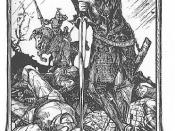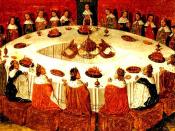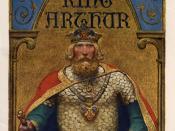King Arthur and the Knight of Canterbury
'King' and 'Knight' are such titles that seem to require power, confidence, and all rule. Yet in some cases it seems that the most important quality in these positions is sure chivalry. Both the Knight of The Canterbury Tales and King Arthur portray this chivalric and modest demeanor, and still hold to be great leaders and heroes among their societies. One who both lacks fear, and has the upmost courtesy, doesn't call for strength, but simply trust in himself and his companions.
In the prologue of the tales, Chaucer tells us that the Knight has such courage, and yet doesn't flaunt his position, nor think himself any better than anyone else. Chaucer seems to envy the Knight, and uses him to represent everything that is right, and somewhat of a dream life for himself. The Knights bravery is what sets him high among the leaders of society, and yet it is his meek and humble ways that keep him close.
King Arthur can indefinitely be described in the same way.
Arthur can be easily recognized right next to the Knight in that he too is a courageous leader, who lacks fear, and holds himself tough, yet he has the surpassing respect for all, and doesn't see himself as an untouchable figure. From "Morte d' Arthur," Malory portrays Arthur as this type of figure, and includes incidents where his respect and honesty overrides his strength and sword. The first and most prevalent example is the fact that in the different stories of Arthur, he distinguishes himself as one of the Knights of the Round Table rather than the headmaster, and leader of his troops. In some stories, it is true that the title of 'King' is given to Arthur simply upon the fact that...


